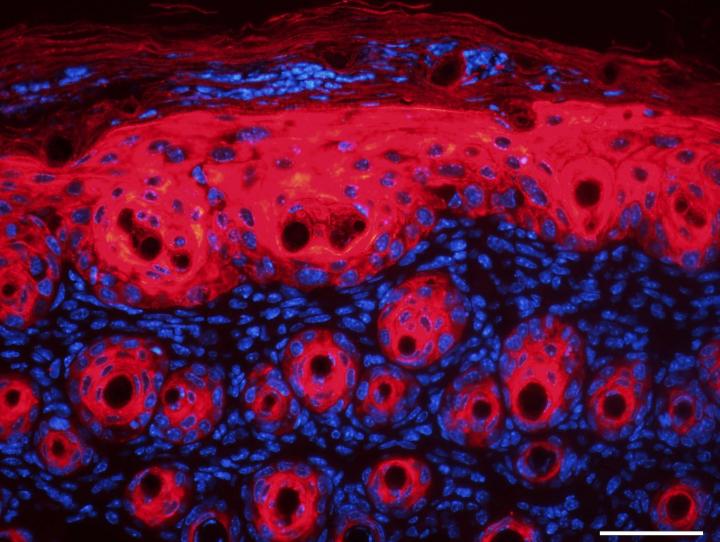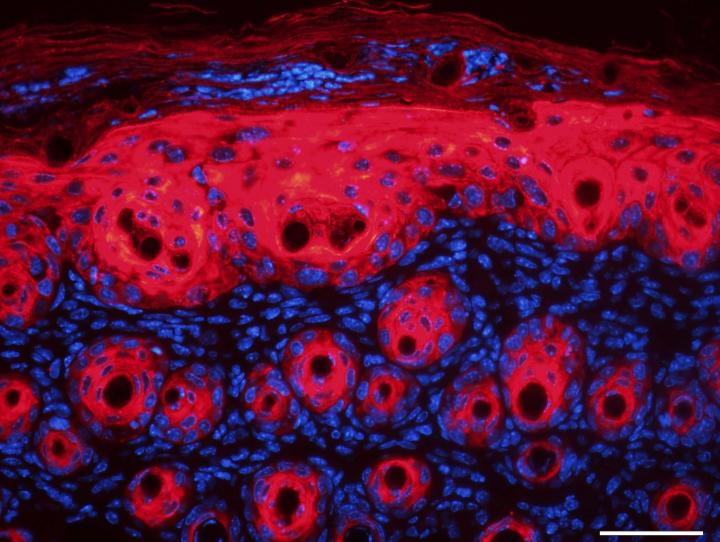
Credit: Holly Anderton/Walter and Eliza Hall Institute
Existing medicines could offer a new way to treat inflammatory skin conditions, researchers at Melbourne's Walter and Eliza Hall Institute and the Royal Melbourne Hospital have revealed.
The research team discovered skin inflammation relies on a protein called RIPK1, and could be prevented by depleting this protein. The finding offers hope that drugs targeting RIPK1, which are currently in clinical trials, could offer relief to people with skin conditions such as psoriasis.
Ms Holly Anderton, Dr Najoua Lalaoui, Dr James Rickard and Professor John Silke from the Walter and Eliza Hall Institute of Medical Research collaborated with Professor George Varigos, a dermatologist from the Royal Melbourne Hospital, on research published recently in the Journal of Investigative Dermatology.
Many inflammatory skin conditions such as eczema and psoriasis can be triggered by the death of cells in the outer layer of the skin, called keratinocytes, said Ms Anderton, who is a PhD student at the Institute enrolled through the University of Melbourne's Department of Medical Biology.
"We were curious about how this cell death triggers inflammation, and how we could potentially switch off that inflammation by inhibiting keratinocyte death," she said.
"Our work relied on a new laboratory model that has many similarities to a rare but fatal form of extreme skin inflammation triggered by certain viral infections or drug reactions, called toxic epidermal necrolysis (TEN)."
The team investigated whether the protein RIPK1 could drive skin inflammation in the TEN model, building on their earlier discovery that RIPK1 acts as a 'gatekeeper' between cell life and cell death.
Dr Lalaoui said the researchers showed that depleting RIPK1 in skin cells was able to prevent the development of TEN. "This finding was exciting as medications that inhibit RIPK1 are already in clinical trials for inflammatory bowel diseases," she said. "Our research would also support the potential use of RIPK1 inhibitors in treating inflammatory skin diseases."
The research revealed an exciting new approach to treating serious inflammatory skin conditions said Professor Varigos, who undertook the research as a sabbatical visiting scientist at the Walter and Eliza Hall Institute. "Inflammatory skin conditions are a significant burden on the Australian community and some more extreme forms, such as TEN, can be fatal or require long hospitalisation like a burn."
"Around two percent of Australians have psoriasis, many requiring clinical management, with immune suppressants treatments, such as cylopsporin, methotrexate and biologics, usually being the recommended treatment. However these treatments don't target the cause of the inflammation and also come with potential complications.
"It would be exciting to see medicines that stop inflammation before it begins, hence potentially offering a new 'upstream' approach to treating these conditions," Professor Varigos said.
###
The research was supported by the Thomas William Francis & Violet Coles Trust, the Australian National Health and Medical Research Council and the Victorian State Government Operational Infrastructure Support Program.
Media Contact
Liz Williams
[email protected]
61-475-751-811
@WEHI_research
Original Source
New target could soothe the itch of inflammatory skin conditions





